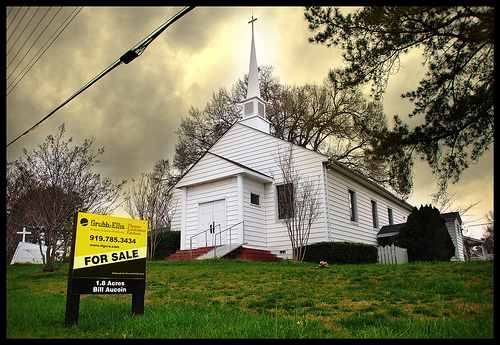Pastors are expected to perform a number of duties, which can be overwhelming. Pastors are not just responsible for preaching in the pulpit; they have numerous other duties, from leading prayer groups to counseling and more. But what happens when the church a pastor is serving falls into hard times like debt or attendance? This puts the pastor between a rock and a hard place. In those situations, selling the church may be the only option to solve both problems, but pastors cannot sell a church without raising eyebrows from the congregation.
Can a pastor sell a church?
The answer is yes, but it’s not as simple as you might think.
In most cases, the pastor will have to get permission from the church’s board of directors before putting a listing on the market. That means that when you’re looking at churches for sale, you’ll see them listed as “for sale by owner” or “to be sold by seller.”
But if you’re interested in buying and selling churches, you should be aware that there are some things you need to know about this kind of transaction before jumping in. In this article you’ll find answers to questions such as should a pastor be on the church bank account, and what happens to a church when the pastor dies.

A Pastor Sell A Church
Let’s be honest, the last thing anyone wants to do is get into a legal controversy over something as sacred as a church. However, there are some legitimate questions about whether a pastor can sell his or her church that need to be addressed. While it’s true that many pastors and churches have been able to sell their property (and sometimes relocate) without incident, there are some strict rules in place regarding how exactly this should be done. It’s important for the pastor and church board of trustees to follow these rules if they want to avoid any legal trouble down the road.
The pastor first needs to get approval from the church board, and usually a vote by the congregation is necessary.
In order to sell your church, you need approval from the board. The board will also decide how much money it will take in exchange for giving up its ownership of the property. Once this is done, you can then move on to selling it to other people who want to buy it.
Only if both boards have passed a resolution specifying otherwise or if you are an officer of the church organization should you be on the bank account. If someone else has access to funds and they make decisions without consulting you first, then they have committed fraud against both boards at once—and so will get punished more severely than just one group would have been punished individually!
Should A Pastor Be On The Church Bank Account
The pastor should not be on the church bank account unless he or she is an officer of the church.
- A pastor should not be on the church bank account unless he or she is an officer of the church.
- If a pastor is not an officer of the church, he or she can withdraw money from the bank account for himself or herself. But, this does not give him or her authority to use those funds for any other purpose.
If the pastor is an officer of the church, then all funds must be used in accordance with state law. If there are no limitations on the amount that officers who are not directors may withdraw from accounts like these, they may do so up to three times their annual compensation (i.e., $300 per day) without first obtaining permission from anyone else. There may also need to be some type of approval process set up so that multiple withdrawals don’t exceed this amount over time; however, churches vary widely on what they allow their pastors and other leaders do with these types of accounts so it’s best to check with your attorney before making any changes at all!
A church can sell its property if it chooses to do so, sometimes to pay off debts or to relocate.
You might have heard that a church can sell its property. Yes, it’s true! It’s not something that happens all the time, but it is possible.
Churches can sell their property if they choose to do so—and sometimes for very different reasons than you might expect. A church could sell its property because it wants to relocate or expand locations in order to accommodate a growing congregation and/or community outreach programs. In other cases, churches may decide to sell land and buildings in order to pay off debts incurred by past pastors who took advantage of the funds available from donations, which is illegal. Or maybe there was an incident where one pastor used donated money for personal expenses like gambling or taking trips with friends; selling off land will help repair any damages caused by this misappropriation of funds.
The church board has authority over the pastor, and may take action against him or her if they violate their duties or act in way that goes against the values of the congregation.
As a pastor, you have a responsibility to the congregation. You must use your position within the church wisely, and act in ways that are consistent with what is expected of you. You are also expected to abide by certain rules or regulations set forth by the church board. If you violate these duties or act in a way that goes against the values of the congregation, they may take action against you—for example, removing you from your position as pastor.
If this happens before reaching retirement age or otherwise becoming eligible for benefits such as health insurance through COBRA (the Consolidated Omnibus Budget Reconciliation Act)
Buying and selling property is complicated, and each state has its own rules about how a church should go about doing it.
Buying and selling property is complicated, and each state has its own rules about how a church should go about doing it. The pastor needs to get approval from the church board, and usually a vote by the congregation is necessary. A pastor also cannot be on a bank account of the church if he or she is not an officer of that organization.

There are a lot of rules churches have to follow when buying and selling property.
Whether or not you can sell the church depends on whether or not you’re a pastor.
If you are a pastor, then there are a lot of rules churches have to follow when buying and selling property.
These include:
- Getting approval from the church board: Many pastors become so sensitive about this point that they refuse to use their own name as an author on articles related to selling churches; some even refuse to be quoted in such pieces at all!
- Getting approval from the congregation: The congregation will be asked if they would like to approve of the sale or not before it happens. If they say yes, then everything goes ahead as planned; if they say no (or don’t give an answer), then there won’t be any sale conducted at all until further notice has been given by those who had previously said no in order for them to reconsider their decision before moving forward with anything else pertaining to this matter being discussed here today.”
What Happens To A Church When The Pastor Dies
When the founding pastor retires, does your church have a plan in place for a new leader to take over? If that’s the case, can it be enforced legally? There are lots of husband-and-wife pastor teams out there who want to make sure that if one of them should pass away, the other can carry on the ministry. Many of these plans, however, are only communicated orally to the board, or if they are put in writing, they lack specificity. The Florida church experienced this. Upon the sudden passing of their pastor, the congregation was left without a clear leader to guide them. Even though he had previously stated that he wanted his wife to carry on the work, the bylaws did not specifically allow for this. Two board members were opposed, but the surviving spouse and another board member both assumed it would be done automatically. The board was now divided and unable to come to an agreement, which led to friction.
Did you know that in the United States, founding pastors lead roughly two-thirds of all independent churches? The bylaws of many of these churches are extremely vague and fail to properly plan for succession.
Here are three things to keep in mind as you map out your succession strategy.
No provision for the pastor’s succession should be made in the bylaws. In many of the bylaws I’ve read, the pastor’s name and the name of his or her successor are clearly spelled out. You don’t have to do that. Having a designated position within the board that would automatically succeed the pastor in the event of his untimely death is a better and more permanent solution. For instance, I think it would be a good idea for a church to appoint the pastor’s spouse to the position of executive vice president and to stipulate in the bylaws that, in the event of the pastor’s death, the incumbent executive vice president would succeed to the pastor’s role. Bylaws, our software, guides churches through the process step-by-step and provides clear language to guarantee that the bylaws are drafted correctly.
Any bylaws that specify the next pastor’s name could be in violation of Canon Law. Many pastors believe they are protected because their bylaws specify their successor. The problem is that they are unaware of the possibility that the bylaws in question do not follow federal law. A church must demonstrate that it serves a public interest, as opposed to a private one, in order to receive federal income tax exemption status, per regulations set forth by the Internal Revenue Service. The Internal Revenue Service (IRS) will review a church’s bylaws to determine whether or not the pastor is acting in his or her own self-interest when making decisions about the church.
Church tax exemptions can be nullified if the bylaws state something like “upon his death, that his wife will automatically succeed him” because such language could be interpreted as serving a private interest. As I mentioned before, positions are preferable to names when planning for succession. You can always put the right people in the right positions to make sure the pastor’s successor is chosen in a legally sound way if you specify which positions will be filled by whom after he retires.
An executive’s succession shouldn’t be decided by a board vote. Although every founding pastor hopes that all board members will steward the vision of the church, I know from experience that many times board members feel that if they were in charge they would do things differently. A shocking number of board members disagree with the pastor’s choice of successor and think someone else should be chosen. Every member of the board brings their own unique perspective to the table. Their past hurts and experiences shape who they are today. Language that makes your successor an automatic event and prevents the board from democratically selecting any successor is crucial.